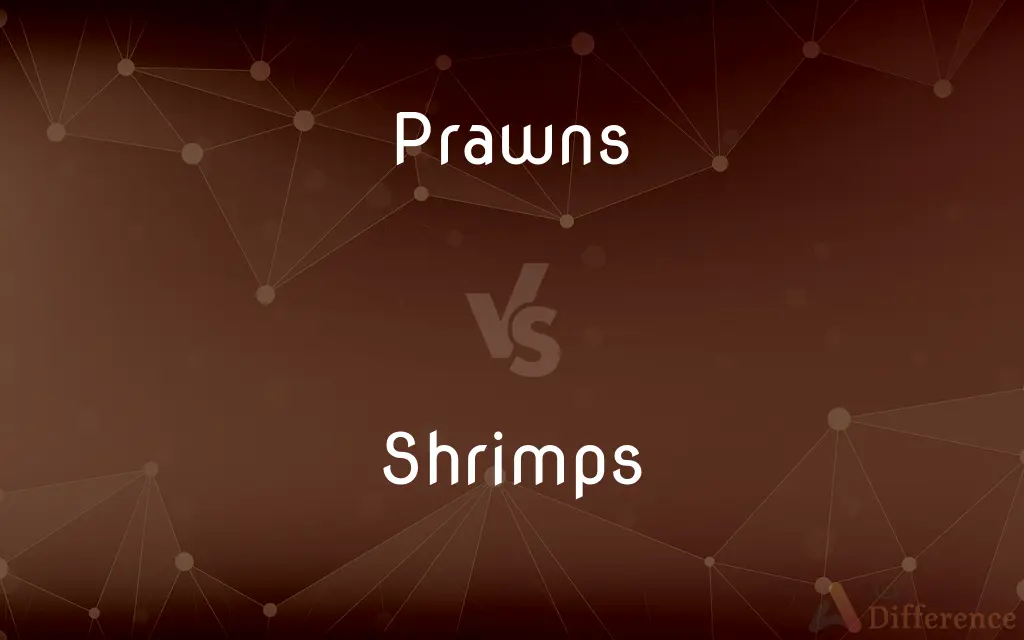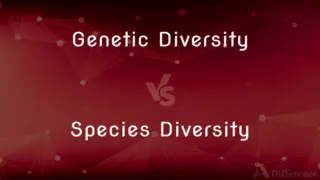Prawns vs. Shrimps — What's the Difference?
Edited by Tayyaba Rehman — By Fiza Rafique — Published on December 5, 2023
Prawns and shrimps are both crustaceans, but they differ in body structure, size, and habitat. While often used interchangeably in cuisine, they are distinct species with unique characteristics.

Difference Between Prawns and Shrimps
Table of Contents
ADVERTISEMENT
Key Differences
Prawns typically have a slightly larger and elongated body compared to shrimps. While both prawns and shrimps possess ten legs, prawns' front pincers are generally larger than the subsequent ones, whereas shrimps' second pincers are usually the most prominent.
Prawns are primarily found in freshwater, while shrimps predominantly inhabit saltwater environments. This distinction affects their taste, with prawns often having a sweeter profile compared to the more briny flavor of shrimps.
In many cuisines, prawns and shrimps are used interchangeably, making it confusing for consumers. However, chefs might prefer prawns for certain dishes due to their meatier texture, while shrimps can be favored for their distinct taste.
In seafood markets, prawns are generally larger and can be sold either with their heads on or off. Shrimps, on the other hand, are commonly sold headless and are available in a range of sizes.
From a biological perspective, prawns and shrimps belong to different suborders within the crustacean family. Prawns belong to the Dendrobranchiata suborder, while shrimps are part of the Pleocyemata.
ADVERTISEMENT
Comparison Chart
Body Structure
Slightly elongated body; larger front pincers
Compact body; prominent second pincers
Habitat
Primarily freshwater
Predominantly saltwater
Taste Profile
Often sweeter
Typically briny
Market Presentation
Often sold with heads
Commonly sold headless
Taxonomical Suborder
Dendrobranchiata
Pleocyemata
Compare with Definitions
Prawns
Large crustaceans related to shrimps but distinct in body structure.
The chef used prawns for the seafood pasta due to their meaty texture.
Shrimps
Typically sold headless in seafood markets in varied sizes.
He purchased a pound of medium-sized shrimps for the salad.
Prawns
Freshwater inhabitants often used in culinary dishes.
The freshwater prawns added a sweet flavor to the curry.
Shrimps
Small to medium-sized crustaceans with a compact body.
The shrimps were perfectly sautéed in garlic and butter.
Prawns
Decapod crustaceans with elongated bodies and large front pincers.
I was amazed by the size of the prawns' pincers in the aquarium.
Shrimps
Decapod crustaceans known for their second set of prominent pincers.
I noticed that the shrimps' second pincers were especially large.
Prawns
Often larger compared to shrimps and sold with their heads on.
She bought some large prawns, complete with their heads, for grilling.
Shrimps
Saltwater inhabitants popular in various cuisines.
Shrimps from the ocean often have a delightful briny taste.
Prawns
Belonging to the Dendrobranchiata suborder within crustaceans.
Biologists classified these as prawns due to their Dendrobranchiata characteristics.
Shrimps
Part of the Pleocyemata suborder of crustaceans.
The biologist identified them as shrimps from the Pleocyemata suborder.
Prawns
Any of various shrimps, especially one that is large or inhabits fresh water.
Shrimps
Any of various small, chiefly marine, often edible decapod crustaceans that have a laterally compressed, elongated body with long antennae and long legs used for swimming. The shrimps include species belonging to the superfamily Penaeoidea of the suborder Dendrobranchiata and to the infraorder Caridea of the suborder Pleocyemata.
Prawns
The flesh of a prawn, used as food.
Shrimps
The flesh of one of these crustaceans, used as food.
Prawns
To fish for prawns.
Shrimps
Any of various similar crustaceans, such as a fairy shrimp.
Prawns
Plural of prawn
Shrimps
Derogatory Slang A person who is small in stature.
Shrimps
To fish for shrimp.
Shrimps
Plural of shrimp
Shrimps
Infl of shrimp
Common Curiosities
What are prawns?
Prawns are large crustaceans related to but distinct from shrimps.
Can prawns and shrimps be used interchangeably in cooking?
While often used interchangeably, they have unique flavors and textures that might suit certain dishes better.
Which is meatier, prawns or shrimps?
Prawns typically have a meatier texture compared to shrimps.
Do prawns and shrimps belong to the same biological family?
Yes, both prawns and shrimps are decapod crustaceans but belong to different suborders.
How do shrimps differ from prawns?
Shrimps are typically smaller, inhabit saltwater, and have a distinct body structure compared to prawns.
Which is sweeter in taste, prawns or shrimps?
Prawns generally have a sweeter taste profile compared to the brinier shrimps.
Are prawns only found in freshwater?
Primarily, yes. Prawns predominantly inhabit freshwater environments.
Where are shrimps commonly found?
Shrimps are predominantly found in saltwater habitats.
How should prawns and shrimps be stored?
Both should be refrigerated and consumed quickly or can be frozen for longer storage.
Is it easy to distinguish between prawns and shrimps visually?
Yes, by noting the size, body structure, and pincers, one can distinguish between the two.
Is there a significant price difference between prawns and shrimps?
Depending on the region and market, prawns can be pricier due to their size and perceived premium quality.
Which is preferred for grilling, prawns or shrimps?
Both can be grilled, but prawns are often preferred due to their size and meatiness.
Which has more varieties, prawns or shrimps?
Both have numerous species, but shrimps have a wider variety due to their global distribution.
Are there any known allergies associated with prawns and shrimps?
Yes, some people are allergic to shellfish, which includes both prawns and shrimps.
Is there a significant difference in nutritional value between prawns and shrimps?
Both are rich in protein, but there might be minor differences in micronutrient content based on their habitats.
Share Your Discovery

Previous Comparison
Aqua-Vu Fishing Camera vs. Marcum Fishing Camera
Next Comparison
Genetic Diversity vs. Species DiversityAuthor Spotlight
Written by
Fiza RafiqueFiza Rafique is a skilled content writer at AskDifference.com, where she meticulously refines and enhances written pieces. Drawing from her vast editorial expertise, Fiza ensures clarity, accuracy, and precision in every article. Passionate about language, she continually seeks to elevate the quality of content for readers worldwide.
Edited by
Tayyaba RehmanTayyaba Rehman is a distinguished writer, currently serving as a primary contributor to askdifference.com. As a researcher in semantics and etymology, Tayyaba's passion for the complexity of languages and their distinctions has found a perfect home on the platform. Tayyaba delves into the intricacies of language, distinguishing between commonly confused words and phrases, thereby providing clarity for readers worldwide.











































